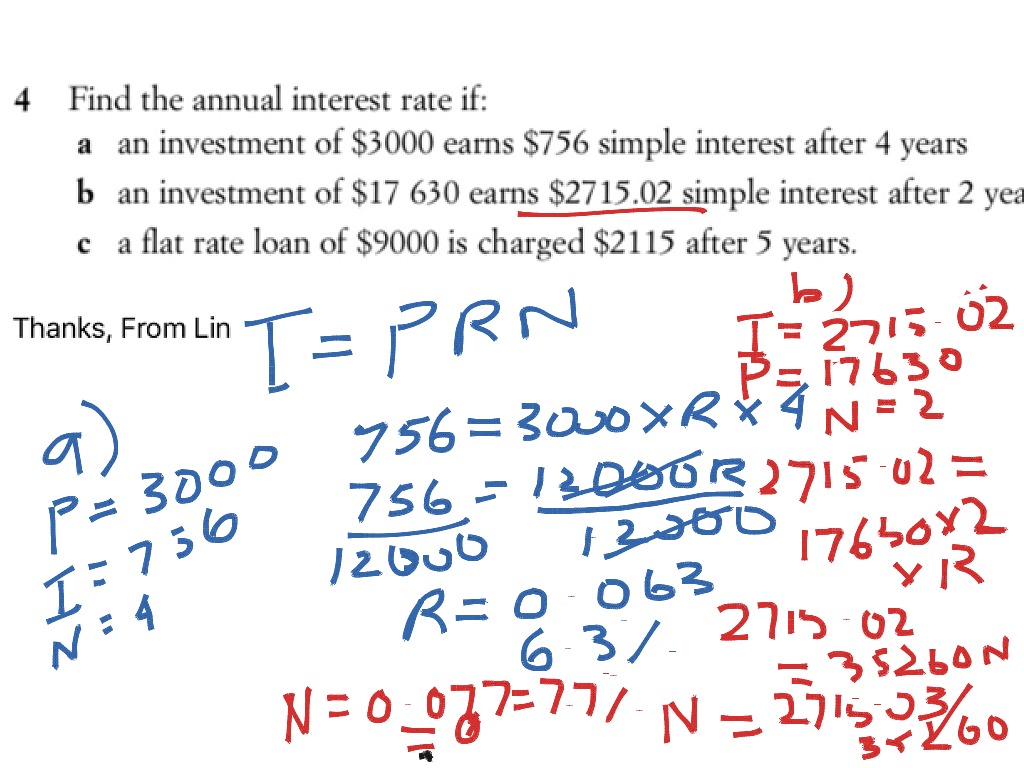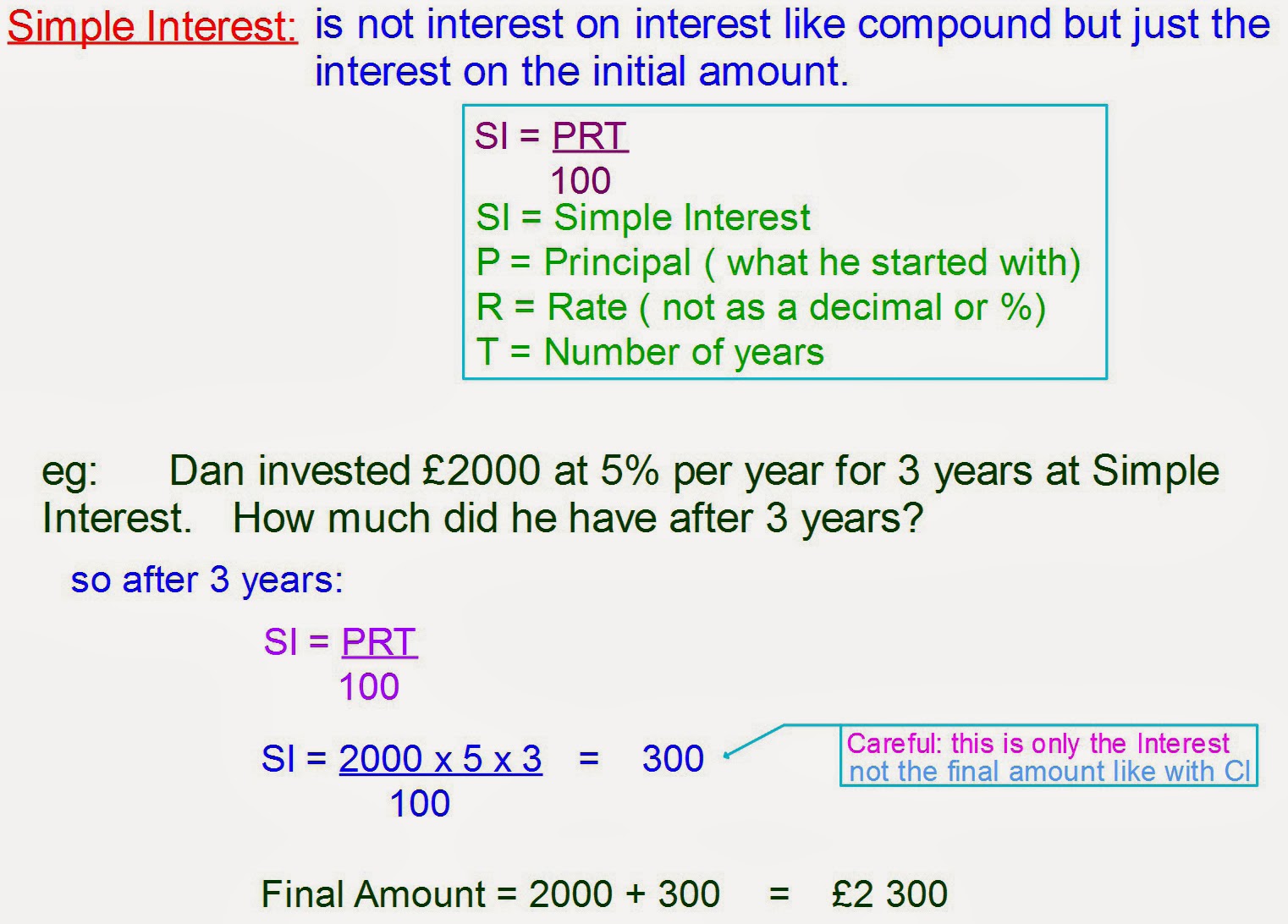Interest In Math
Interest In Math - Interest is an additional amount of money that is paid by the borrower to a lender or an investor beyond reimbursing the amount borrowed. Interest, in its most simple form, is calculated as a percent of the principal. For example, if you borrowed $100 from a friend and agree to repay. With compound interest, we work out the interest for the first period, add it to the total, and then calculate the interest for the next period, and so.
With compound interest, we work out the interest for the first period, add it to the total, and then calculate the interest for the next period, and so. Interest, in its most simple form, is calculated as a percent of the principal. For example, if you borrowed $100 from a friend and agree to repay. Interest is an additional amount of money that is paid by the borrower to a lender or an investor beyond reimbursing the amount borrowed.
For example, if you borrowed $100 from a friend and agree to repay. Interest is an additional amount of money that is paid by the borrower to a lender or an investor beyond reimbursing the amount borrowed. Interest, in its most simple form, is calculated as a percent of the principal. With compound interest, we work out the interest for the first period, add it to the total, and then calculate the interest for the next period, and so.
Simple interest finding the interest rate Math ShowMe
With compound interest, we work out the interest for the first period, add it to the total, and then calculate the interest for the next period, and so. Interest is an additional amount of money that is paid by the borrower to a lender or an investor beyond reimbursing the amount borrowed. Interest, in its most simple form, is calculated.
How to Calculate Simple Interest Formula, Meaning, & More
Interest, in its most simple form, is calculated as a percent of the principal. For example, if you borrowed $100 from a friend and agree to repay. Interest is an additional amount of money that is paid by the borrower to a lender or an investor beyond reimbursing the amount borrowed. With compound interest, we work out the interest for.
View Simple Interest Math Worksheet Images The Math
Interest, in its most simple form, is calculated as a percent of the principal. With compound interest, we work out the interest for the first period, add it to the total, and then calculate the interest for the next period, and so. Interest is an additional amount of money that is paid by the borrower to a lender or an.
What is Simple Interest? How to Calculate Simple Interest with Examples
For example, if you borrowed $100 from a friend and agree to repay. With compound interest, we work out the interest for the first period, add it to the total, and then calculate the interest for the next period, and so. Interest, in its most simple form, is calculated as a percent of the principal. Interest is an additional amount.
Compound Interest IGCSE at Mathematics Realm
Interest is an additional amount of money that is paid by the borrower to a lender or an investor beyond reimbursing the amount borrowed. With compound interest, we work out the interest for the first period, add it to the total, and then calculate the interest for the next period, and so. Interest, in its most simple form, is calculated.
39 SIMPLE INTEREST MATH WORKSHEET FOR GRADE 7
Interest, in its most simple form, is calculated as a percent of the principal. For example, if you borrowed $100 from a friend and agree to repay. With compound interest, we work out the interest for the first period, add it to the total, and then calculate the interest for the next period, and so. Interest is an additional amount.
Simple and Compound Interest Mathematics for the Liberal Arts
Interest, in its most simple form, is calculated as a percent of the principal. For example, if you borrowed $100 from a friend and agree to repay. With compound interest, we work out the interest for the first period, add it to the total, and then calculate the interest for the next period, and so. Interest is an additional amount.
Mr Rouche's Maths Simple Interest
Interest, in its most simple form, is calculated as a percent of the principal. With compound interest, we work out the interest for the first period, add it to the total, and then calculate the interest for the next period, and so. Interest is an additional amount of money that is paid by the borrower to a lender or an.
Compound Interest IGCSE at Mathematics Realm
Interest is an additional amount of money that is paid by the borrower to a lender or an investor beyond reimbursing the amount borrowed. Interest, in its most simple form, is calculated as a percent of the principal. With compound interest, we work out the interest for the first period, add it to the total, and then calculate the interest.
😀 How to solve interest rate math problems. Word Problems. 20190105
Interest, in its most simple form, is calculated as a percent of the principal. Interest is an additional amount of money that is paid by the borrower to a lender or an investor beyond reimbursing the amount borrowed. For example, if you borrowed $100 from a friend and agree to repay. With compound interest, we work out the interest for.
Interest, In Its Most Simple Form, Is Calculated As A Percent Of The Principal.
Interest is an additional amount of money that is paid by the borrower to a lender or an investor beyond reimbursing the amount borrowed. For example, if you borrowed $100 from a friend and agree to repay. With compound interest, we work out the interest for the first period, add it to the total, and then calculate the interest for the next period, and so.


.gif)



